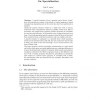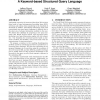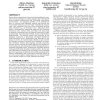2190 search results - page 435 / 438 » Large-scale extraction and use of knowledge from text |
DAGSTUHL
1996
13 years 8 months ago
1996
A partial evaluator, given a program and a known "static" part of its input data, outputs a specialised or residual program in which computations depending only on the st...
SIGMOD
2010
ACM
13 years 7 months ago
2010
ACM
Automated extraction of structured data from Web sources often leads to large heterogeneous knowledge bases (KB), with data and schema items numbering in the hundreds of thousands...
CORR
2010
Springer
13 years 7 months ago
2010
Springer
Event-driven automation of reactive functionalities for complex event processing is an urgent need in today's distributed service-oriented architectures and Web-based event-d...
ENGL
2007
13 years 7 months ago
2007
—“A General Reflex Fuzzy Min-Max Neural Network” (GRFMN) is presented. GRFMN is capable to extract the underlying structure of the data by means of supervised, unsupervised a...
IM
2007
13 years 6 months ago
2007
This paper describes Armil, a meta-search engine that groups the web snippets returned by auxiliary search engines into disjoint labeled clusters. The cluster labels generated by A...



